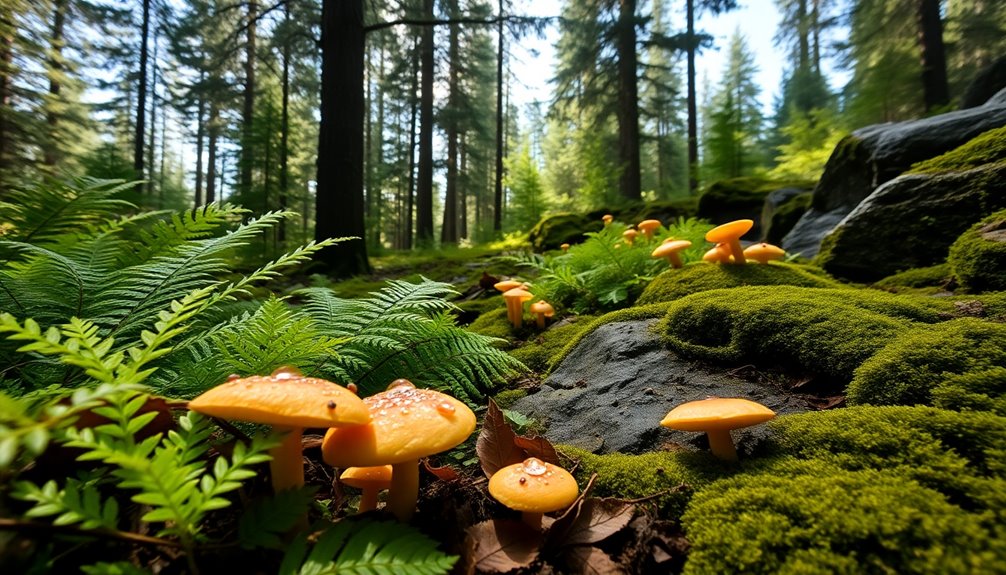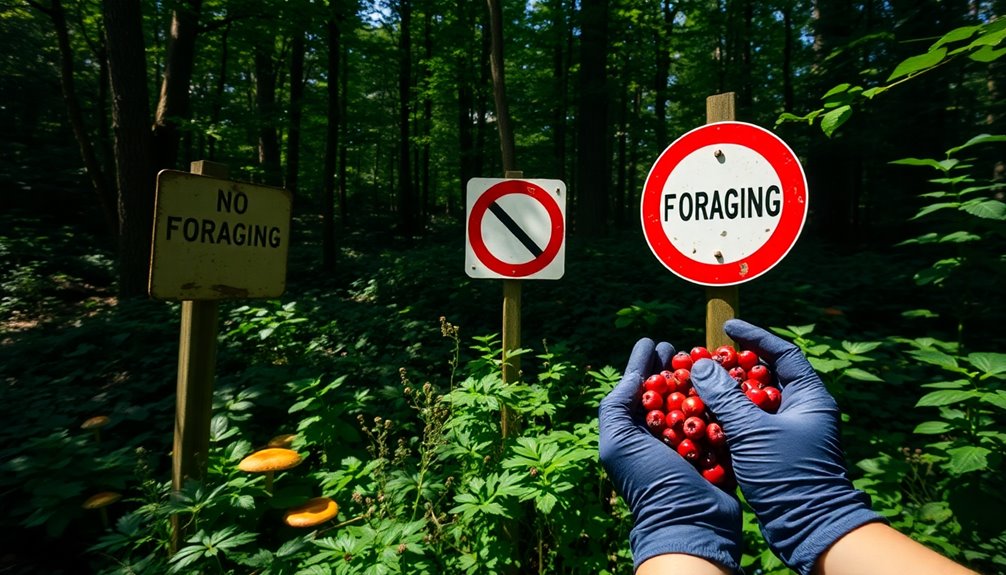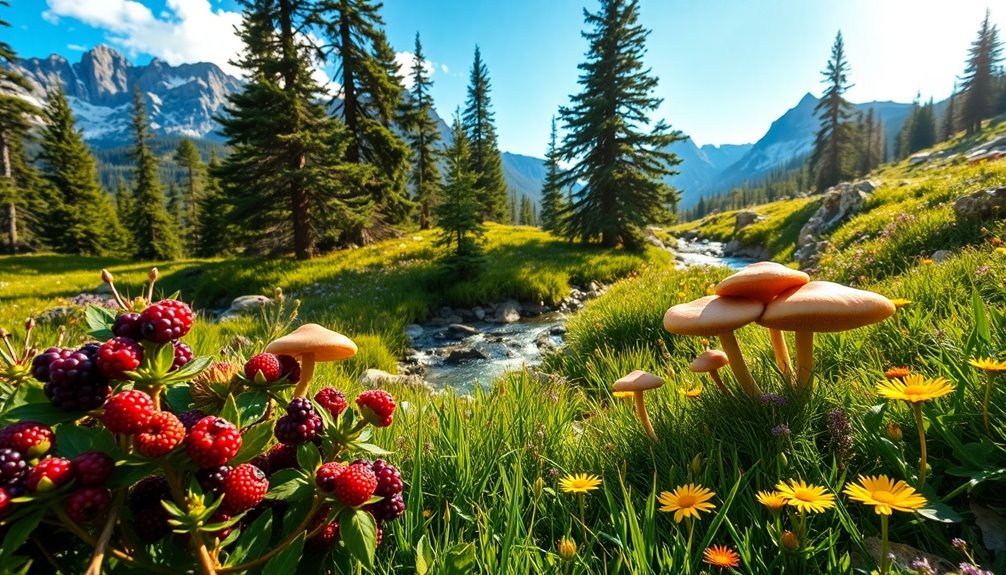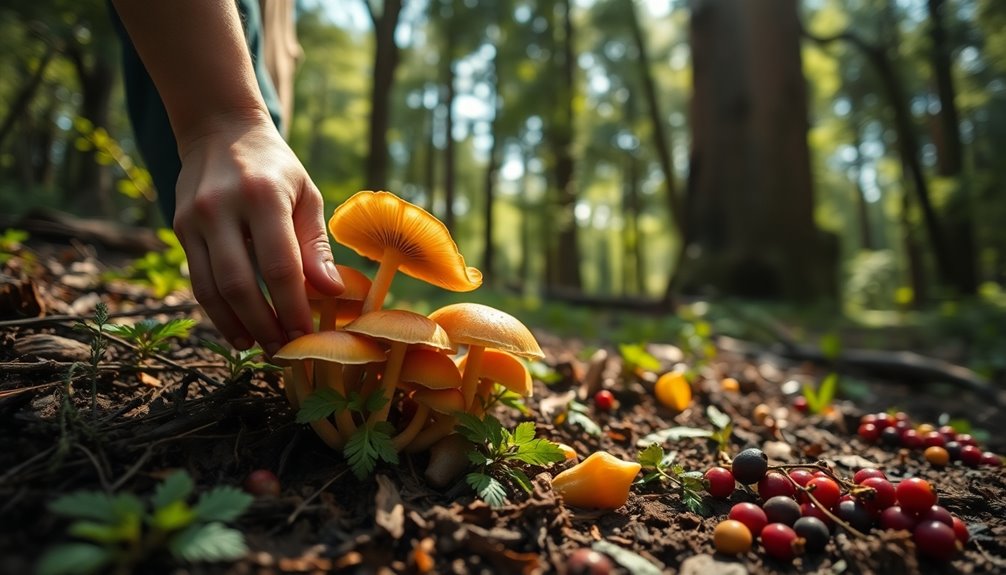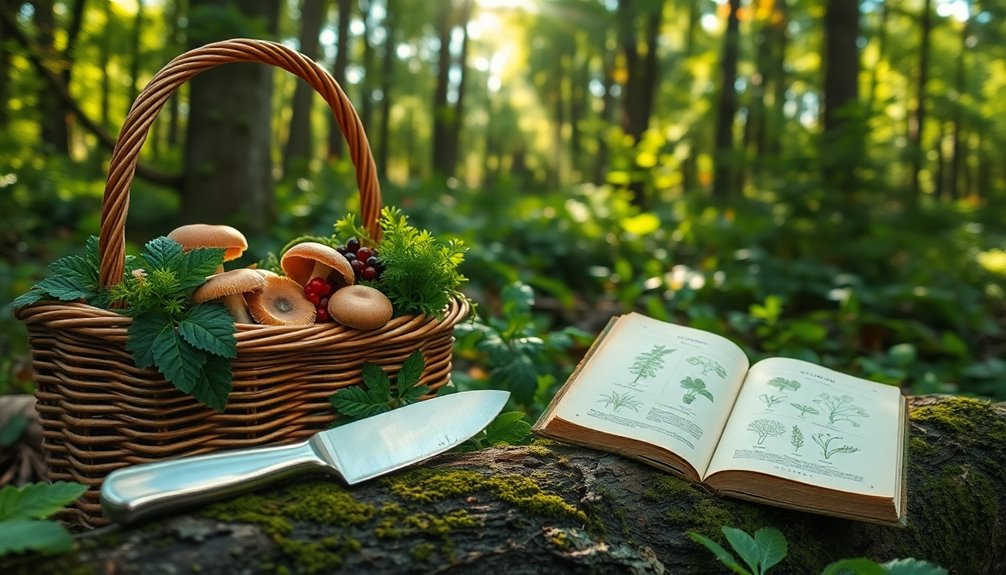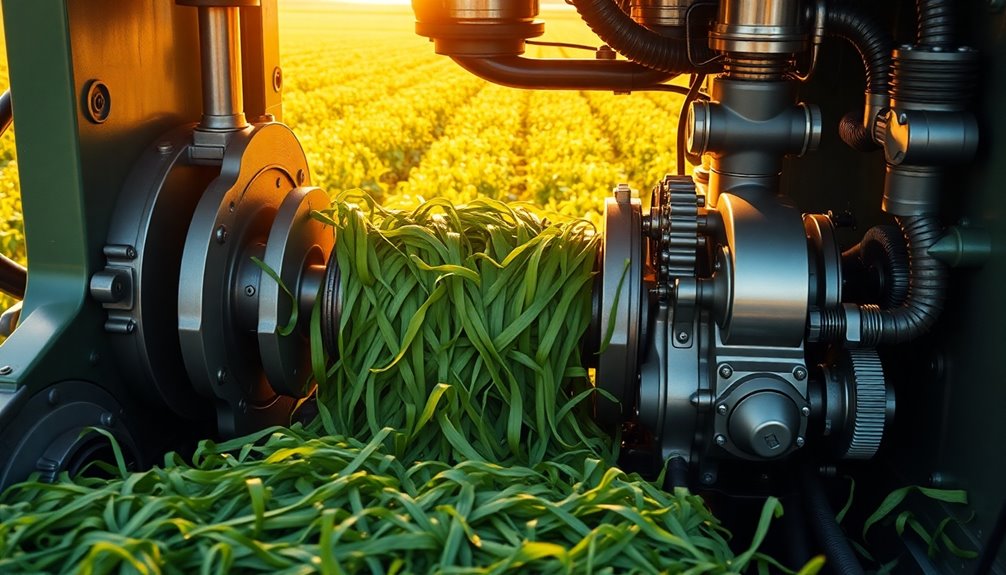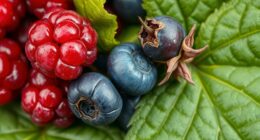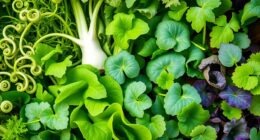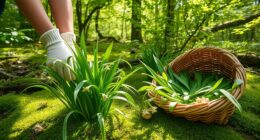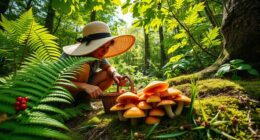You can forage in national forests, but you need to know the laws first. Most forests allow you to collect up to 5 gallons of mushrooms for personal use without a permit. However, different forests have different regulations, so it's essential to check with local offices for specifics. Certain plants may be protected, and collecting them is illegal. If you plan to harvest larger quantities, a personal-use permit could be required, often at no cost. Understanding these guidelines guarantees you forage responsibly and legally. There's much more to uncover about the best practices and regulations that will help you navigate this adventure.
Key Takeaways
- You can collect up to 5 gallons of mushrooms per day for personal use in many national forests without a permit.
- Always check local regulations, as foraging laws vary significantly between national forests and may have specific restrictions.
- Foraging on BLM lands is limited to 1 gallon per person per day and prohibits commercial harvesting.
- Obtain personal-use permits if required; these are typically free or cost under $10.
- Practice ethical foraging by respecting local laws, plant identification, and the cultural significance of plants.
Understanding Foraging Laws

Foraging in National Forests requires a solid understanding of local laws and regulations. You can typically collect up to 5 gallons of mushrooms for personal use without needing a permit. However, for larger quantities, you'll likely need to obtain a permit, which is usually free or under $10.
Remember, foraging laws can vary markedly from state to state and even among specific national forests. That's why it's vital to research local regulations before heading out.
Some national forests allow you to collect edible plants, berries, and nuts for personal use, but there might be restrictions on certain species or areas to protect biodiversity.
Always check with local forest offices to clarify which permits you need and what's allowed in public lands. They can provide detailed information on specific foraging laws and practices in their jurisdiction.
To stay compliant, familiarize yourself with the regulations before you start foraging. Understanding these laws won't only keep you out of trouble but also promote sustainable foraging practices that benefit both you and the environment.
Foraging in National Forests
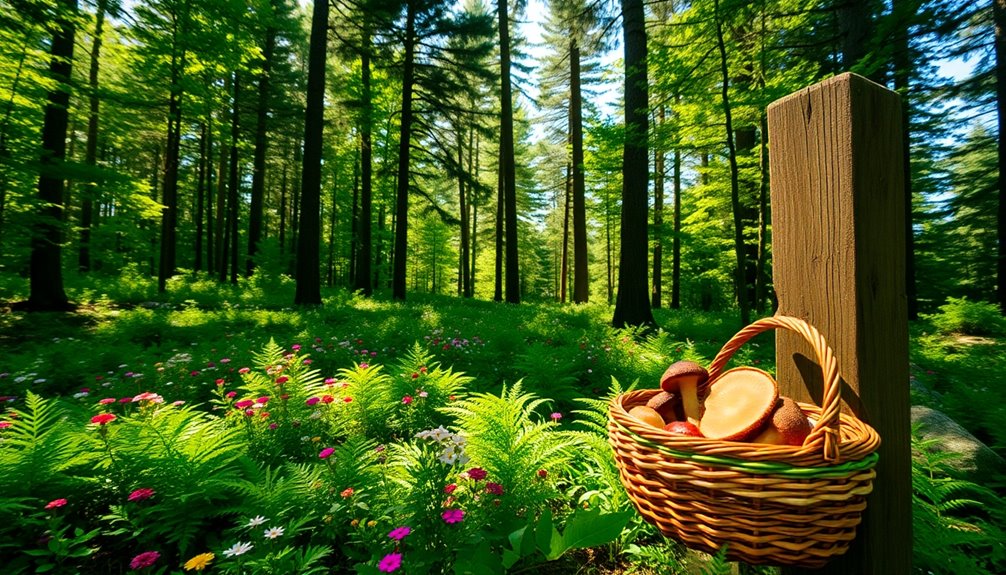
Exploring the abundant resources of National Forests can be a rewarding experience, especially when it comes to foraging. If you're interested in foraging for wild mushrooms, you'll be pleased to know that in many national forests, you can collect up to 5 gallons of mushrooms per person per day without needing a personal-use permit.
However, it's essential to check the specific regulations for each forest, as some may have stricter rules or even prohibit foraging for protected species.
On Bureau of Land Management (BLM) lands, the rules differ slightly, typically allowing only 1 gallon per person per day for personal use, with commercial picking usually prohibited.
Before you head out, it's a smart idea to contact your local forest office. They can provide important information about any specific limits on quantities and types of mushrooms you can collect.
Permits and Regulations

Understanding the permits and regulations governing foraging in National Forests is vital for a successful outing. Generally, foraging is allowed, and personal-use permits are often free or cost under $10. These permits typically allow you to collect mushrooms and other edibles, with some areas permitting up to 5 gallons of mushrooms without a permit.
However, be aware that specific regulations may vary by national forest. When foraging for certain species, like truffles or matsutake mushrooms, stricter regulations might apply, requiring special permits. It's important to contact local forest offices beforehand to clarify the permit processes and any unique regulations that may pertain to the specific area you plan to forage in.
If you're considering foraging on Bureau of Land Management (BLM) lands, keep in mind the rules differ. Generally, you're allowed only 1 gallon per person per day for personal use, and commercial harvesting is usually prohibited.
Ethical Foraging Practices

When you head out to forage, it's essential to embrace ethical practices that guarantee both your enjoyment and the health of the ecosystem.
By following some responsible foraging guidelines, you can secure sustainability while protecting biodiversity. Here are four key practices to take into account:
- Know Local Laws: Familiarize yourself with local regulations to avoid illegal harvesting and respect protected species and habitats. Additionally, understanding investment regulations can help you make informed decisions when considering foraging as a sustainable practice.
- Practice Plant Identification: Properly identify plants before harvesting, as some may be toxic or endangered. Investing time in learning about plant types can enhance your foraging experience and ensure safety.
- Respect Cultural Significance: Be aware of the cultural importance of certain plants to Indigenous communities. Don't harvest those that hold traditional value without permission.
- Avoid Polluted Areas: Stay clear of locations known for pollution or pesticide contamination, as they can harm your health and the environment. Additionally, consider joining local foraging groups that can provide resources and support for ethical foraging practices.
Resources for Foragers
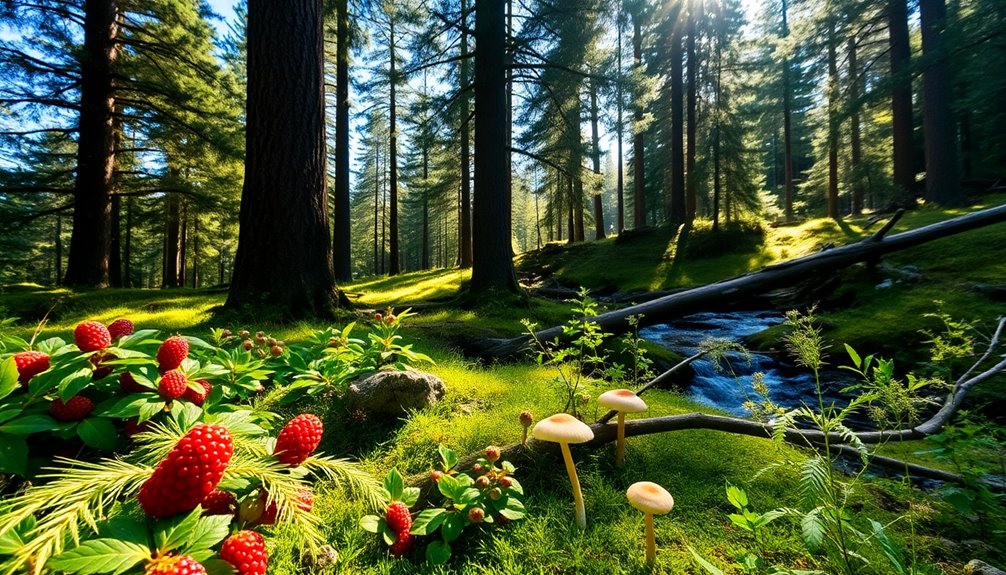
Foragers seeking to enhance their experience in National Forests can tap into a variety of valuable resources. First, familiarize yourself with the regulations that vary from one national forest to another. Some forests allow foraging for wild mushrooms without a permit, permitting gatherings of up to 5 gallons, while others may impose specific collection limits.
Always check your local forest office for details on personal-use permits, which are often free or under $10.
If you're foraging in areas managed by the Bureau of Land Management (BLM), remember that there's a daily limit of 1 gallon per person for personal use. Commercial picking is usually prohibited, so make sure you're foraging for personal use only.
It's essential to research the specific park you plan to visit, as regulations can differ widely.
If you're considering foraging on private lands, don't forget to obtain permission from the landowner. Some local logging companies may also grant permits for foraging on their properties.
To avoid any legal issues, always contact your local forest office before heading out to forage. Being informed helps you enjoy nature responsibly and sustainably. Additionally, consider incorporating high-calorie options such as nuts and seeds in your foraging expeditions to maintain energy levels while exploring.
Frequently Asked Questions
Is It Legal to Forage in National Forests?
Yes, it's generally legal to forage in national forests, but you need to be aware of specific regulations.
Most forests allow personal-use foraging, often with limits on the quantity you can collect. You might need a permit, which you can usually get from local forest offices.
Always check local guidelines to avoid taking protected species or foraging in conservation areas where stricter rules apply.
Being informed guarantees you forage responsibly and legally.
Are You Allowed to Forage in the New Forest?
Yes, you're generally allowed to forage in the New Forest for personal use, but there are some important rules to remember.
Always check local guidelines since certain plants may be protected or seasonal limits may apply, especially for wild mushrooms.
Make sure you respect the environment and only take what you need.
If you're on private land, it's best to ask for permission from the landowners before foraging.
Educate yourself about safe plant identification too!
What Are the Rules for Foraging?
You might think foraging is a free-for-all, but it's not quite that simple!
When you're out there, you've gotta know the rules. Each area has its own guidelines, so check local regulations before harvesting.
In many places, you can gather a limited amount of mushrooms for personal use without a permit. Just remember, if you're on private land, always ask the owner first.
Happy foraging, but stay informed to avoid pitfalls!
How Do You Forage Legally?
To forage legally, start by checking local regulations for the area you're interested in. Each location has specific rules about what you can collect and in what quantities.
Often, you can gather up to 5 gallons for personal use without a permit, but always confirm. If you're foraging on private land, get the landowner's permission first.
Contact local forest offices for guidance on permitted species and any seasonal restrictions that might apply.
Conclusion
To sum up, foraging in national forests can be a rewarding experience, but you need to know the rules. Always check local regulations before you head out. For instance, imagine you find a patch of wild blueberries but learn that the area requires a special permit for foraging. By staying informed, you not only enjoy nature's bounty but also protect it for future foragers. So, gear up, do your homework, and enjoy the adventure responsibly!

